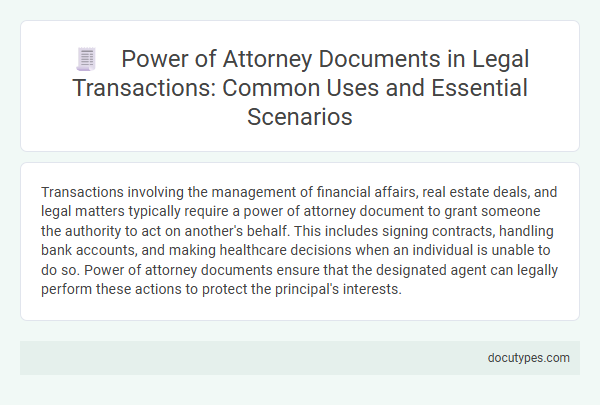Transactions involving the management of financial affairs, real estate deals, and legal matters typically require a power of attorney document to grant someone the authority to act on another's behalf. This includes signing contracts, handling bank accounts, and making healthcare decisions when an individual is unable to do so. Power of attorney documents ensure that the designated agent can legally perform these actions to protect the principal's interests.
Introduction to Power of Attorney in Legal Transactions
A Power of Attorney (POA) is a legal document that grants one person the authority to act on behalf of another in various transactions. Understanding which types of transactions require a POA is essential to ensure your legal and financial matters are handled appropriately.
- Real Estate Transactions - A POA is often necessary for buying, selling, or managing real estate when the principal cannot be present.
- Financial Transactions - Handling banking, investments, or tax matters typically requires a POA to authorize third-party actions.
- Legal Proceedings - Representation in court or signing legal documents can mandate a POA to empower an agent legally.
Defining Power of Attorney: Key Legal Concepts
A Power of Attorney (POA) is a legal document granting an individual the authority to act on behalf of another in specified matters. Understanding key legal concepts of POA is essential for identifying transactions that require this authorization.
- Durable Power of Attorney - Remains effective even if the principal becomes incapacitated, allowing continuous decision-making.
- General Power of Attorney - Provides broad authority to manage all legal and financial matters on behalf of the principal.
- Limited Power of Attorney - Grants authority for specific transactions or limited time frames.
Transactions involving property sales, financial management, healthcare decisions, and legal representation commonly require a Power of Attorney document.
Types of Power of Attorney: General, Special, and Durable
| Type of Power of Attorney | Description | Transactions Requiring This POA |
|---|---|---|
| General Power of Attorney | Grants broad authority to an agent to act on Your behalf in a variety of legal and financial matters. |
|
| Special (Limited) Power of Attorney | Confers authority to perform specific acts or transactions for a limited time period. |
|
| Durable Power of Attorney | Remains valid even if You become incapacitated, allowing the agent to continue acting without interruption. |
|
Common Uses of Power of Attorney in Business Deals
Power of attorney (POA) documents are essential for various business transactions where one party authorizes another to act on their behalf. Common uses include signing contracts, managing bank accounts, and handling real estate transactions.
Business deals often require a POA when the principal cannot be physically present to execute agreements or complete financial tasks. This legal tool ensures seamless decision-making and protects business interests. It is frequently used in mergers, acquisitions, and other corporate negotiations.
Power of Attorney in Real Estate Transactions
Power of Attorney (POA) documents are essential for various legal transactions, particularly in real estate. In real estate transactions, a POA allows an appointed agent to buy, sell, or manage property on your behalf, ensuring decisions are made even if you are unavailable. This document is crucial for handling title transfers, mortgage signings, and closing agreements efficiently.
Medical and Healthcare Power of Attorney: Legal Implications
What types of transactions require a power of attorney document? A power of attorney is often needed for medical and healthcare decisions when an individual cannot advocate for themselves. This legal document appoints someone to make healthcare choices on your behalf during incapacity, ensuring your wishes are respected.
How does a medical and healthcare power of attorney impact legal implications? It grants the designated agent authority to consent to or refuse medical treatments, access medical records, and communicate with healthcare providers. This authority carries significant legal responsibilities and requires clear, explicit directives to avoid disputes or misunderstandings.
Financial Management through Power of Attorney
A power of attorney (POA) document is essential for authorizing someone to manage your financial affairs when you are unable to do so. Common transactions requiring a POA include handling bank accounts, paying bills, and managing investments.
POA is crucial for real estate transactions, such as buying, selling, or leasing property on your behalf. It also covers tax-related matters, retirement account management, and dealing with insurance policies efficiently.
Essential Scenarios Requiring Power of Attorney
Certain transactions mandate a Power of Attorney (POA) to authorize another person to act on one's behalf. These include financial, legal, and real estate dealings where direct presence is impractical or impossible.
Essential scenarios requiring a POA involve managing bank accounts, signing contracts, or handling property sales and purchases. Legal processes such as litigation representation or healthcare decisions also often necessitate a specialized POA document.
Revocation, Termination, and Limitations of Power of Attorney
Power of Attorney (POA) documents are essential for authorizing agents to act on behalf of principals in various transactions. Understanding the revocation, termination, and limitations of POA ensures proper legal use and protection of parties involved.
- Revocation of Power of Attorney - The principal can revoke a POA at any time by providing written notice to the agent and relevant institutions.
- Termination of Power of Attorney - A POA terminates automatically upon the principal's death, incapacity (if not durable), or as specified within the document.
- Limitations of Power of Attorney - POAs may restrict the agent's authority by specifying transaction types, duration, or requiring the principal's prior consent for certain acts.
What Types of Transactions Require a Power of Attorney Document? Infographic

